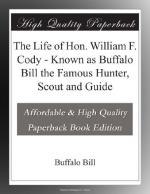The following afternoon he again requested me to go out and get some fresh buffalo meat. I didn’t ask him for any wagons this time, but rode out some distance, and coming up with a small herd, I managed to get seven of them headed straight for the encampment, and instead of shooting them just then, I ran them at full speed right into the camp, and then killed them all, one after the other in rapid succession. Colonel Royal witnessed the whole proceeding, which puzzled him somewhat, as he could see no reason why I had not killed them on the prairie. He came up, rather angrily, and demanded an explanation. “I can’t allow any such business as this, Cody,” said he, “what do you mean by it?”
“I didn’t care about asking for any wagons this time, Colonel; so I thought I would make the buffaloes furnish their own transportation,” was my reply. The Colonel saw the point in a moment, and had no more to say on the subject.
[Illustration: BRINGING MEAT INTO CAMP.]
No Indians had been seen in the vicinity during the day, and Colonel Royal having carefully posted his pickets, supposed everything was serene for the night. But before morning we were roused from our slumbers by hearing shots fired, and immediately afterwards one of the mounted pickets came galloping into camp, saying that there were Indians close at hand. The companies all fell into line, and were soon prepared and anxious to give the red-skins battle; but as the men were yet new in the Indian country a great many of them were considerably excited. No Indians, however, made their appearance, and upon going to the picket-post where the picket said he had seen them, none could be found nor could any traces of them be discovered. The sentinel,—who was an Irishman—insisted that there certainly had been red-skins there.
[Illustration: “INDIANS!”]
“But you must be mistaken,” said Colonel Royal.
“Upon me sowl, Colonel, I’m not; as shure ez me name’s Pat Maloney, one of thim rid divils hit me on the head wid a club, so he did,” said Pat; and so, when morning came, the mystery was further investigated and was easily solved. Elk tracks were found in the vicinity and it was undoubtedly a herd of elks that had frightened Pat; as he had turned to run, he had gone under a limb of a tree, against which he hit his head, and supposed he had been struck by a club in the hands of an Indian. It was hard to convince Pat however, of the truth.
A three days uninteresting march brought us to Beaver Creek where we camped and from which point scouting parties were sent out in different directions. Neither of these parties discovering Indians they all returned to camp about the same time, finding it in a state of great excitement, it having been attacked a few hours previous by a party of Indians, who had succeeded in killing two men and in making off with sixty horses belonging to Co. H.
That evening the command started on the trail of these Indian horse-thieves; Major Brown with two companies and three days rations pushing ahead in advance of the main command. Being unsuccessful, however, in overtaking the Indians, and getting nearly out of provisions—it being our eighteenth day out, the entire command marched towards the nearest railroad point, and camped on the Saline River; distant three miles from Buffalo Tank.




